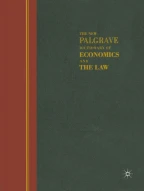
It is standard doctrine in Anglo-American contract law that a promise is not enforceable without ‘consideration’: normally, a quid pro quo for which the promise was exchanged. It follows that the gratuitous or benevolent promise will be denied legal effect, no matter how clearly the promisor may have wished to bind himself. By contrast, any promise made as part of a bargain carries with it a presumptive guarantee, furnished at state expense, in the form of legal enforceability. Assuming that the promisor is free not only to make or withhold a promise, but also to make it on such terms and conditions as he chooses, the possibility of assuming a legally enforceable obligation can only be beneficial to both parties; since to the extent the bonded (i.e. enforceable) promise is more valuable to the promisee, it must be correspondingly more valuable to the promisor as well, whether this added value is realized through an ordinary exchange or an interdependent utility function.
This is a preview of subscription content, log in via an institution to check access.
eBook EUR 534.99 Price includes VAT (France)
Softcover Book EUR 348.14 Price includes VAT (France)
Hardcover Book EUR 316.49 Price includes VAT (France)
Tax calculation will be finalised at checkout
Purchases are for personal use only